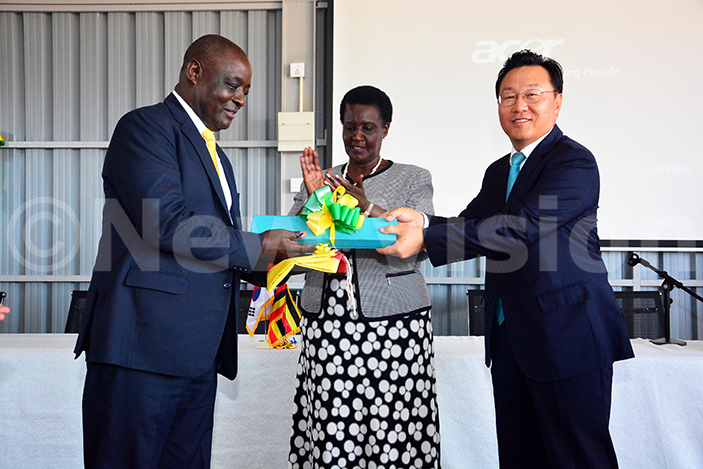Koreans handover 13b centre to transform rural agriculture.
May 25, 2017
Park Jong-Dae, handing over the over sh13billion facility, said Uganda has a new dawn to be able to train its citizenry in proven agriculture approaches that work.

The rain pelted the corrugated metal roofing sheets. It was very dreary outside and the dignitaries who huddled inside the shade at the national farmers’ leadership centre at Kampiringisa sat freezing, but quietly paying attention to the Republic of Korea Ambassador to Uganda Park Jong-Dae who read a speech.
The stratosphere was so unfriendly, but perhaps can be looked at as the rains of blessings that will usher in a new era of Uganda’s social economic development, tailored on Koreas’ Saemaul Undong model — for it was at this very cold day when the Koreans officially handed over the NFLC, which will train hundreds of Ugandans in modern agriculture farming practices.
It’s been a long time coming, and indeed like trade minister Amelia Kyambadde put it, the centre was initially proposed to be set up in Kabale district, but then Mpigi is more in the heart of Uganda and thus a better location for a facility billed to teach the next big development model in the transformation of Uganda.
Park Jong-Dae, handing over the over sh13billion facility, said Uganda has a new dawn to be able to train its citizenry in proven agriculture approaches that work.
“The centre will become the core of rural agriculture transformation and ultimately transform Uganda. We need to show every people in the region and the World that it is possible to develop Uganda, that we are writing a new era,” the ambassador said.
The facility, like its name suggests, will be the national centre where ordinary farmers are made extraordinary, where small clusters are turned into galvanised strong unions that will demand rightful pay for members’ produce.
Principal Zac Muyaka promised they will not stop at anything until they transform Uganda from a peasant to a middle-income economy and beyond using the doctrines of hard work.
“We need to stop this this cliché of Government Etuyambe, the feeling that we are powerless until someone comes to our rescue. We need to start thinking that we are winners and asking ourselves what we can do for our country.”
The trainings will involve mind-set change and better and practical solutions to our day to day challenges. We want to teach our people… that this is how you can do it and get out of poverty.”
For the start, he said the centre will be training over 2000 Ugandans annually in tested approaches that work.
The centre has demonstration farms for piggeries, wananchi will be trained on better raring practices, it has a demonstration farm for mushrooms et al….
“We need to train Ugandans to eradicate poverty. Those (pioneers) that we will train will train others…. and it will cascade all the way down,” the principal who has been tasked the responsibility of steering the centre to the next level said.
Agriculture minister Vincent Ssempijja thanked the Koreans for the continued support to Uganda, especially in agriculture and their insistence on transforming rural areas.
“What we are witnessing today and what the centre will be teaching has been tested and it has worked.
At the time of (Uganda’s) independence (1962) South Korea’s GDP stood at $62 compared to Uganda’s $192. Fifty years down the road, Korea has been able to grow its economy to among the top 11 (worldwide). Uganda is still a developing country. So if we have a chance of imitating the same model the Koreans followed, we are so privileged.
The model, the Saemaul Undong, also known as the New Community Movement, launched in1970 by then South Korean President Park Chung-hee to modernise the rural south Korean economy, helped the people to notice their needs and move towards finding solutions.
“On behalf of Government of Uganda, I’m honoured at this function, when KOICA (Korea International Cooperation Agency) is handing over NFLC (to the people of Uganda),” the minister said, thanking the Koreans for their aid.
Uganda’s economy has been growing at a limping six percent. Agriculture, which is the backbone of the economy providing close to 37% of the GDP, is still largely subsistence. Calls have been made to modernise it, but poor people mind-set and lack of leadership have suffocated the pleas.
“We need to get our farmers change their mind-sets to look at agriculture as a business,” Ssempijja said.
The status of NFLC will be independent.
Opened by President Yoweri Museveni and his then Korean Counterpart Park Geun-hye last year, it is hoped the centre will be the pillar of rural transformation.
Mpigi district resident district commissioner Hajji Swaibu Wagwa Lubega called on the centre’s leadership to not abandon it, but to better it and make it transform Uganda.
“When things are handed over to us (Ugandans), we tend to mismanage them, but please not this centre. We shouldn’t come here a year from now and all this (centre) has been wasted… and the toilets are not flashing, when the whole area is blocked and a mess,” he said.
Vincent Ssempijja made the same plea. He emphasised the place’s maintenance.
Amelia Kyambadde said she was happy the centre was functional three years after it was commissioned.
“Agriculturalists work with traders. They produce, we (traders) process, add value and look for market. So, thank you the Koreans,” she said.
After the handover function, guests were treated to a luncheon
